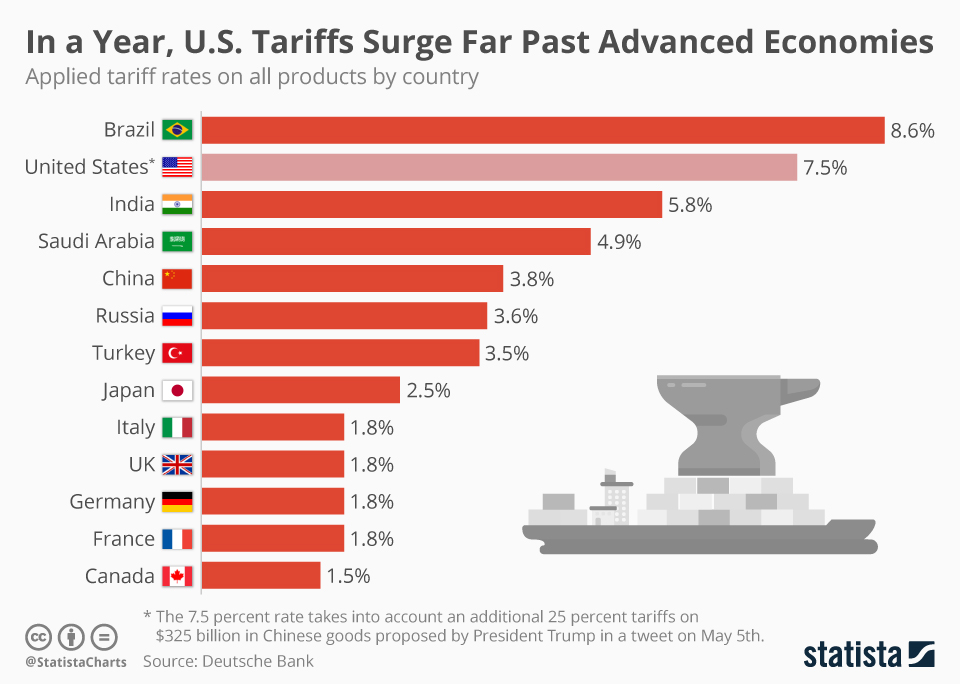Tariffs and the U.S. economy have become hot topics in political and economic discussions, particularly in light of recent policy changes. The imposition of tariffs, especially under the Trump administration, was presented as a strategy to protect American jobs and push for more equitable trade relations. Prominent figures like Senator Rick Scott advocate this stance, believing that tariffs could significantly benefit U.S. workers by eliminating foreign trade barriers. However, the impact of tariffs is multifaceted, often leading to tensions in U.S.-China trade relations and complex economic implications. As debates unfold regarding U.S. trade policy, understanding the balance between protectionism and free trade becomes crucial for evaluating the overall health of the U.S. economy.
The subject of import duties, particularly as they relate to America’s financial landscape, has gained considerable traction among lawmakers and economists alike. These protective tariffs, primarily aimed at sectors vulnerable to international competition, are seen as tools to safeguard domestic industries. Proponents, including Republican leaders, argue that such strategies not only aim to enhance economic opportunity for American laborers but also seek to reshape longstanding trade agreements. Conversely, critics warn of the potential fallout from escalating trade conflicts, especially concerning relations with major economies like China. These discussions often highlight the complex interplay of tariffs and their repercussions on national economic health and international partnerships.
The Economic Impact of Tariffs on American Workers
Tariffs have long been a contentious issue in America’s trade policy, often touted as a solution to create a fairer competition for American workers. Senator Rick Scott supports these tariffs, believing they will protect U.S. jobs and boost domestic production. He argues that by lowering trade barriers, American industries can thrive in the global market without the threat of cheap foreign goods brought in by nations with less stringent labor and environmental standards. This notion presents a hopeful perspective that tariffs can serve as a shield, allowing American workers to maintain a competitive edge.
However, critics argue that while tariffs may seem beneficial in the short term, they often lead to unintended economic consequences that can harm consumers and businesses alike. The increased costs of imported goods due to tariffs can result in higher prices for everyday items, impacting the consumer’s purchasing power. Economists caution that the taxes imposed on foreign goods can disrupt U.S. trade policy, potentially leading to retaliation from other countries, which may escalate into trade wars that further harm the U.S. economy.
Frequently Asked Questions
What are the economic implications of tariffs on the U.S. economy?
The economic implications of tariffs on the U.S. economy can be significant. Tariffs are designed to protect domestic industries by increasing the cost of foreign goods, which may lead to short-term benefits for some U.S. manufacturers. However, they can also result in higher prices for consumers and retaliatory measures from other countries, potentially causing overall economic contraction and volatility in markets.
How do Rick Scott tariffs impact U.S. trade policy?
Rick Scott’s tariffs are a part of a broader strategy aimed at reshaping U.S. trade policy. Scott argues that these tariffs level the playing field for American workers against foreign competitors, particularly China. However, critics point out that such measures could escalate trade tensions and may lead to economic downturns, questioning their overall effectiveness in achieving intended trade goals.
What is the relationship between tariffs and U.S.-China trade relations?
The relationship between tariffs and U.S.-China trade relations has become increasingly strained due to the implementation of high tariffs by the U.S. on Chinese imports. This has resulted in retaliatory tariffs from China, impacting businesses and consumers in both nations. Navigating these tariffs is crucial for U.S.-China trade relations and can shape future negotiations.
Can tariffs lead to inflation in the U.S. economy?
Tariffs can contribute to inflation in the U.S. economy by increasing the cost of imported goods. Higher tariffs usually mean companies pass on these costs to consumers, resulting in increased prices for products. However, the overall impact on inflation can vary depending on other economic factors such as domestic supply chains and consumer demand.
What are the arguments for and against tariffs in the context of the U.S. economy?
Arguments for tariffs in the context of the U.S. economy include protecting domestic industries, safeguarding jobs, and reducing trade deficits. However, opponents argue that tariffs can lead to higher consumer prices, retaliatory tariffs from other countries, and potential trade wars that could harm the overall economy. Balancing these perspectives is critical for effective U.S. trade policy.
| Key Points |
|---|
| Rick Scott supports tariffs as a means to help U.S. workers and level the playing field against foreign competition. |
| The government implemented tariffs as part of a strategy to change U.S. trade policy, leading to market volatility. |
| Furman argues that tariffs could negatively impact the U.S. economy by harming trade relationships and increasing trade deficits. |
| Scott believes strong actions against China are necessary, viewing it as the most significant economic threat. |
| The tariffs imposed include a 10% rate on most countries, while China faces a much higher tariff of 145%. |
| Scott emphasizes fiscal responsibility, suggesting a balanced budget and spending cuts are vital for economic health. |
Summary
Tariffs and the U.S. economy are a contentious topic, with proponents like Senator Rick Scott arguing that they can help American workers by reducing competition from imports. Scott defends the implementation of tariffs as a way to boost U.S. manufacturing and confront economic threats from countries like China. However, economists, including Jason Furman, caution that such measures could lead to negative consequences for the economy, including potential inflation and trade deficits. The ongoing debate highlights the complex relationship between trade policy and economic health in the United States.
